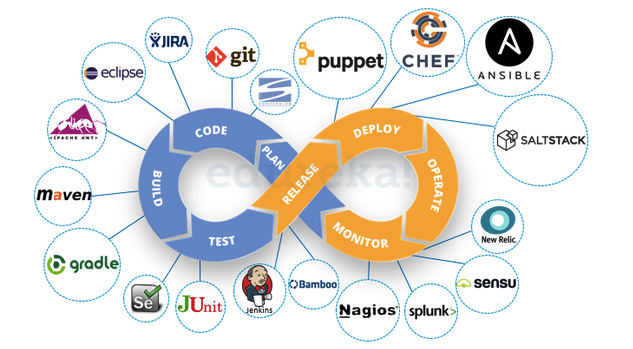Introduction to DevOps
Background of DevOps
In the ever-changing landscape of the Information Technology world, new technologies and concepts are being introduced every day. So you have to constantly keep learning new things in order to stay ahead of your competition and make your life easier as an IT enthusiast. Being agile is the most important factor to become successful as an organization. The adoption of Agile culture by a huge number of organization in past few years is the reason why DevOps was born. The speed at which DevOps is changing the way software development and operations teams work is astonishing. NXG Labs provides end-to-end DevOps consulting based out of Pune for hassle-free adoption of DevOps concepts in your existing projects to ensure implementation of continuous integration, build automation and continuous delivery.
What is DevOps?
Definition of DevOps is different from different people’s perspective in a software development team. First, we’ll see what DevOps means – the name DevOps is a combination of Development (Dev) and IT Operations (Ops) teams i.e. Development+Operations=DevOps. Traditionally in an organization, development and operations teams are supposed to work independently and connect to each other only when they face some issues or at the time of crucial deployments but in DevOps, they are supposed to be merged into one or at least work really closely. This approach in real life leads to an effective and high speed automated way of application development and deployment. In DevOps developers and the operations teams work collaboratively from beginning to code the application until it is released. DevOps is more of a cultural change that you need to follow to improve your skills, efficiency and in-turn product quality.

Why DevOps?
Let’s take a look on the traditional way of building, testing and deploying the application first – the developer develops the application and builds the test version which is then sent to the QA team. QA team performs testing of the application and reports issues to the developer. After successful testing, approval is given to the operations team to deploy the application on a server. IT operations team configures the environment to release the application. If some problem occurs while deploying the application in the production environment, operations team needs to get back to the development team to fix the problem manually and that can take a lot of time and efforts which even leads to business loss in many cases. If all configuration is done correctly by the operations team post-bug-fixing and testing, only then the application gets released. This process is time-consuming, lengthy and is prone to manual errors. This is where we need automation techniques to ensure a faster development and release cycle. DevOps team helps to build an environment in which the development, testing and release of the application can be done automatically. The advantage of using automation technique is that it is a less time-consuming process and it reduces chances of human-errors made during the build-test-release-deploy cycle.
How DevOps team solves the problem?
DevOps bridges the gap between Development and Operations teams thereby ensuring tight integration and understanding between the two. The main motto of the DevOps team is to flourish in an environment with the help of available automated software tools that will automatically build, test and deploy the application on the server. For that DevOps team need a good scripting language knowledge. There are many automation tools available in the market such as Jenkins, Git, Docker, etc. By using these tools you can build a fully automated development environment. You can build, test and deploy the application efficiently and at a high speed by using tools like source control(Git), continuous integration server(Jenkins), and automatic deployments(Docker).
DevOps consulting in Pune Case Study:
Client details :
Android app based startup approached us for DevOps consulting in Pune
Objective:
The client team was following the regular traditional way of building and deploying the Android app. But in that process they were facing many challenges – manual errors, wasted time in integration and builds, code quality issues to name a few . To overcome those challenges and to deliver better quality results on time, NXG Labs helped them adopt DevOps culture.
Our Aim:
-
- To build, test and deploy application at a high speed by using automation tools.
- Continuous integration of the source code.
- Continuous delivery of the application.
- Reduce human errors in the manual process of building and deploying the application.
- Reusability approach for a better business efficiency.
- Documentation standard and consistency in coding.
- Increase productivity through teamwork.
Achieved:
-
- Client team is now building and deploying the application by using automation tools i.e.Git, Jenkins and docker.
- Time for building and deploying the application has reduced.
- Continuous delivery of the product is ensured by using a continuous integration server (Jenkins in this case).
- The whole process is automated so chances of human error are negligible.
- Documentation standard has improved.
- Consistency in coding has increased.
- Due to the involvement of DevOps team overall productivity has increased
- NXG’s DevOps consulting service has ensured 100% client satisfaction once again.
Challenges:
-
- The detailed documentation of the whole process being was not available due to which NXG’s DevOps consultants had to spend a lot of time documenting the existing flow.
- To write automated scripts to collaborate repositories with continuous integration server and deploy application automatically on the server
There is a lot more that me and my team at NXG Labs will be sharing with you about DevOps in coming weeks. You need to adopt an agile culture for proper implementation of DevOps and better productivity. Streamling your plan-develop-test-build-deploy process is where DevOps will play an important role. I hope you have got the basic idea about DevOps. Please share your opinions and suggestions about DevOps by commenting below.

